april 2 2006 : asmara, eritrea, africa
Yesterday morning we caught a bus to Asmara, the capital of Eritrea, about four hours away. The bus was a small Japanese minibus converted to seat about twenty-five people, a couple of babies, dozens of boxes of salt, possibly some livestock, and whatever else needed transporting. The first bus we were corralled onto was already full, but they tried to rearrange people, moving them to seats in the center aisle so we could have the window seat. Nobody seemed thrilled with that arrangement, so we backed out and went to the next bus in line allowing us to take our pick of which seat we wanted. Somehow we managed to pick the one with a broken aisle seat, giving us an unprecedented amount of space. We opened the window wide and sat back to enjoy the ride.
As we got underway we were surprised to see everyone start closing up their windows. It was ninety degrees outside, but with the breeze it felt great. Within half a mile all the windows had been shut, except ours. And soon we got a tap on the shoulder asking us to close ours as well. It was crazy.
The second the windows were all closed up the temperature inside the bus soared. We couldn’t understand it. Occasionally a window would be opened for somebody to yell to a friend as we passed by and if it was left open for more than a few seconds people would start to hike up their collars and shiver. The locals body temperature must have been at least forty degrees cooler than ours, because Ali and I were soaked through from the heat.
Besides from the temperature the bus ride was pretty nice as far as third-world bus rides go. Our driver actually seemed to care that his bus didn’t topple down the mountainside in a ball of flames, which was a pleasant change. Of course he loved his music, and he loved it on full blast. Ali and I are now singing ballads to each other in Arabic. “Ashtaak, ashtaak, ashtaak, w-asaal a’ankoum el-ashwaaa.”
The mountains were interesting in that they were tiered every twenty feet. At a distance each mountain appeared to have hundreds of horizontal lines across it, but up close you couldn’t really see them at all. I figured at first they were just natural paths, but then noticed that the stones were piled up into nice even walls for miles and miles. I can’t imagine who did all that work, but it seems to keep the mountainside from simply washing down to the bottom when they do get rain.
The locals on the bus were extremely quiet, which is something we’re getting used to here in Eritrea. They don’t show any interest in us at all, which is fine, but it does feel a little strange after our experiences pretty much everywhere else.
The bus made one stop along the way for everyone to get off and take a break. Soon a hundred kids surrounded the bus selling little straight sticks that are used as a toothbrush substitute. They peel the bark back from one end and mash it up until it looks like a brush, then they sit there all day rubbing their teeth with it.
When we got to Asmara we asked a local if he knew of a nice hotel. We had absolutely no information on Asmara so were just kind of winging it. He recommended the Albergo Italia so we hopped in a cab and asked him to take us there. The hotel turned out to be a five star place. We had no idea that Eritrea would even have a hotel like this. We walked in and found out that it was ridiculously expensive and were about to leave when the manager hustled up and offered us a deal we just couldn’t turn down. I don’t think there are more than about three guests in the place.
The hotel is the oldest in Eritrea dating back to 1899 and was just redone last year. We dropped off our bags and went straight back down to the terrace for lunch. It was time for a pizza. The best part of eating pizza in Eritrea is that the people on the bulletin boards who get all in a huff over our eating patterns can’t even say anything about it since pizza is actually a local food here. Granted, the Italians have been gone 40 years now, but some traditions must live on.
Something we’ve noticed in our travels is that the food menus around the world invariably have something on them that they call “American.” Here the American pizza consisted of mushrooms, pineapple, and mint. Of all the many crazy pizza combinations we American’s might eat, I think we can be pretty sure that has never been one of them. The next day we were in a café and noticed that the American burger included a big fat fried egg on it. Personally I hate eggs, but never once in America have I ever had to ask for my cheeseburger without egg on it, that’s a Kiwi/Ozzie thing. We ended up ordering a pizza of the non-American variety and it was excellent.
After lunch we went for a walk around town. The city is billed as the cleanest capital in Africa, and I would guess probably lives up to the name. The main street is lined with cafés, shops, and little bars. The cafés had tables out on the sidewalks and every table was full of well dressed locals having tea and pastries. The locals were all dressed as if it was winter in Chicago instead of Asmara. They were all wearing pants, long sleeves, and heavy winter coats. All the clothes were very nice however, and Ali and I were actually feeling pretty scrubby in our jeans, t-shirts, and flip-flops.
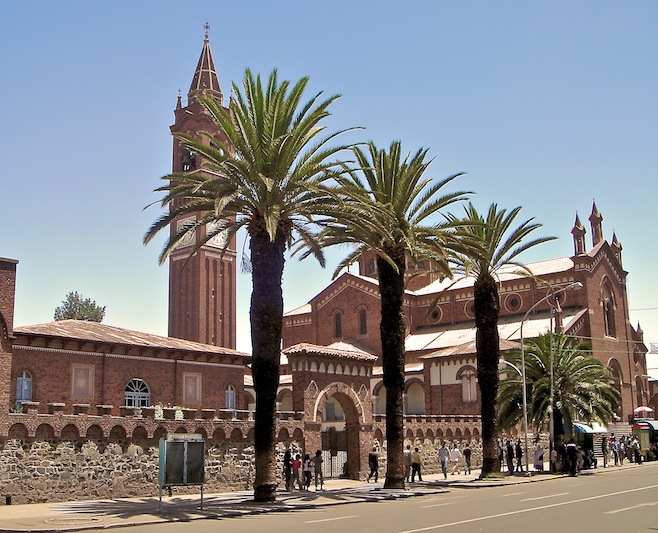
Today we went out intending on stopping at the Egyptian embassy to get our visas for our visit to Egypt. We don’t necessarily have to have them, but thought it would make life a little easier. The embassy turned out to be closed so instead we found a nice café for a snack and stopped in at the internet café to see what else there might be to do here. It turned out there was nothing to see other than the city streets themselves. So we just continued to wander around town. The sidewalk cafés only appeared to be for tea and coffee so for a beer we eventually found ourselves popping in on some of the local bars down the back streets instead.
Each bar is about 25 feet deep and maybe 15 feet wide. Our first stop didn’t have much atmosphere, pretty much relying on the 13″ television with EriTV blasting at full volume for entertainment. Next door we found Bar Africa (all bars have single word names, and all are about as unique as this one) to be much more interesting. Inside they had a billiards table with a bunch of locals gathered around having an intense game. We sat down and watched them play for a while. They called the game billiards, but it was totally different than our billiards back home. It was actually just like bocce ball except on a table instead of a lawn. The locals continued to be extremely quiet with us, until one guy finally gathered up the courage to say hello and tell us a little about the game.
While playing their game everybody kept one eye on the table and one on us. Ali was the only women in the place, which can sometimes be a little awkward, but when we left she gave the guys a big smile and said goodbye. They all instantly smiled, waved, and yelled goodbye as we walked out the door. Sort of like shy little schoolboys.
Today we realized how much our standards have changed as far as restaurant bathrooms go. At Bar Africa I made the scouting mission and came back to Ali with a glowing review. I told her, “It’s great! It’s just right down at the end of the alley, AND there is even a piece of metal you can use to lock the door.” We now tend to overlook the fact that the toilet is just a stinking hole in the middle of a dirt floor.
Notice in that picture of Ali that the bar name is on a Coke sign. The signs are everywhere. You see Coke advertised all across the country, yet you will never find any. The only place we’ve found that has Coke is our hotel, and it cost 25 nakfa, whereas a beer only cost 7. Just about every little store we go in to has one of those big Coca-Cola refrigerators sitting in the corner completely empty.
april 3 2006 : asmara
This morning we laid in bed as long as we could before heading downstairs and checking out. We walked outside to catch a cab to the bus station. The only reason we were going to take a cab is because we weren’t really sure where the station was. We found a cabbie sitting in his car reading a book and asked him how much. He told us 50 nakfa (about $3 USD), and I offered him twenty. He just scoffed and went back to reading his book. He didn’t even try to bargain. To put that in perspective, a four hour bus ride across the country cost us 60 nafka. I swear that in some countries cabbies must be the most well off people there are. They can seem so completely uninterested in making money. In the end we decided to walk and just ask people where it was at. It turned out to be about six blocks away.
At each bus station there is one guy that seems to run the show. He is in charge of putting people on the buses and determining what can and can’t come along. We found this guy and he led us around to an empty bus, putting us in the front row behind the driver. We couldn’t be more pleased with his seat choice, because on the bus ride here the other day, the driver and the front seat passenger had been the only ones with their windows cracked. So we figured we’d be getting a hint of a breeze on this trip.
An hour later with the bus now full, we got underway. Ali and I looked at each other and said at the same time, “That was fast.” We then started laughing because it once again proved how low our standards have become; an hour wait now seems lightning quick. The bus pulled onto the main road outside of town where suddenly all of the windows closed at once. The passenger girl left her window open a crack but we weren’t feeling it. Our driver completely closed up and then we realized that for some reason our window didn’t open at all. We were sealed in again.
A half an hour later the sweat was dripping down our backs and puddling up on the seat. And then there was the smell. The smell of thirty people in a metal can crawling down the road under the noon day sun in Africa is something we won’t soon forget. Soon we began to hallucinate. Or maybe we weren’t, since we all saw the same thing. We were still high up in the mountains when we saw a couple of huge red ass apes on the side of the road. Then a few more, and a few more, until suddenly a couple of the biggest were screaming and chasing the bus down the road. Even the locals seemed completely surprised by the incident.
The next hour passed with the two of us in and out of consciousness before the doors suddenly opened and we stumbled out into the cool eighty-five degree breeze for a quick twenty minute break. There we downed a hot cup of tea, seeing as that is the only beverage available anywhere, and then it was back on the bus to perform an instant replay of the previous two hours. It was torture. The worst part of all was not knowing why in the world these people would do this to themselves. It was beautiful outside.
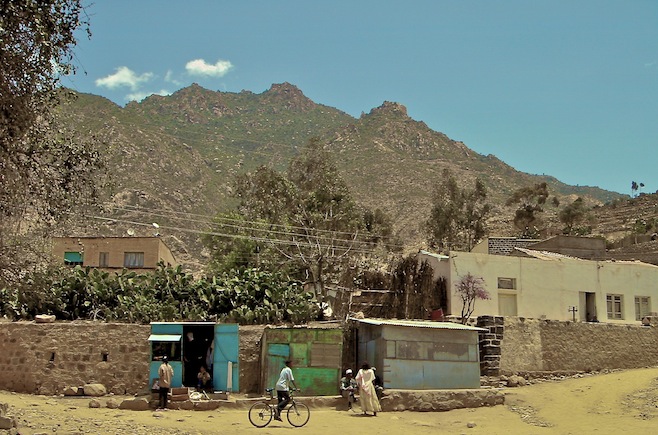
At some point in the afternoon we managed to make our way back to the dock where we found the dinghy deflated once again. My favorite seam just keeps on unpeeling a little more every day and I just keep on chasing it around with the super glue. Eventually it’s bound to give up and let me win. We piled in to our flat dinghy and I tried to pull up the anchor I had thrown out to keep the dinghy from banging against the pier the whole time we were gone. Of course the anchor had managed to get stuck on something and it took me ten minutes of pulling in every direction to finally get it to pop out again. All of this was under the intense gaze of ten “workers” who were silently watching us from fifteen feet away. All in all not the best day and definitely not the best way to end our little side trip, but when is the trip home ever fun?
Who ever said there was nothing to be learned from our website? Here’s a sample of a quiz one math class in Connecticut just took. Good luck.
Pat bought pizzas as follows:
a. On the Galapagos Islands, he bought a 12-slice pie for $15.00
b. In Tonga, he bought a 4-slice pie for $5.98
c. In Bora Bora, an 8-slice pie was $10.05
d. In Tahiti, 2 8-slice pies sold for a total of $20.15
Show calculations for each pizza purchase. Determine where Pat got the best buy.Canned chili is a staple on Bumfuzzle. Which brand is the best buy when stocking up?
a. Chili for the Courageous: 16 oz can for $1.36
b. Chicago FireHouse Chili: 40 oz can for $3.52
c. Mo’orea Magnificent Chili: 32 oz can for $2.76
d. Whangaparaoa White Hot: 8 oz can for $.70
Show calculations for each chili option. Determine the best buy.
april 6 2006 : massawa, eritrea, africa
Nothing much exciting to report from Massawa, in fact we’re starting to get a little bored here. We got diesel yesterday which turned out to be our second most expensive ever. It started out with hiring a taxi to take me to some fancy office in the next town over. There I was brought in front of a very grumpy official looking man sitting behind the most expensive desk I’ve ever seen. He asked me how much diesel I needed and I told him 350 liters. I really only wanted 200 liters but had been warned beforehand to ask for way more than I really needed. He looked down his nose at me and said, “Too much.” So I went through the charade and told him I really, really needed it. He asked why and I explained that I was sailing north and the winds would be on the nose and I could be in danger if I didn’t have enough fuel. Finally, he said gruffly, “200 liters only!” I sighed, said, “Well, if that’s the best you can do then thank you.” He signed a piece of paper and sent me to the next office where I had to receive a coupon to give to the gas station.
This is the first major port we’ve been to that doesn’t have diesel available for boats. After getting the coupon we went to the gas station and filled up the jerry jugs. Total cost, and remember, this is the local price, $4 USD per gallon. Add to that the cost of a driver/guide for three hours (yes, three hours to get fuel) and it comes closer to $4.50. The thing is we probably didn’t really need all of that, but then I think about what happens if we start running low of fuel along the coast of Sudan and an extra 50 bucks or so doesn’t seem so bad.
While I spent the morning zipping back and forth to the boat with fuel I was beaming at how well my latest dinghy repair was holding up. Later in the day we got to the dinghy dock and found it once again lying limp. Yet another seam had opened up and I could fit my fist through it. It’s a good thing the dinghy has a hard bottom because even with the thing completely deflated we can still motor back to the boat. I got out the super glue and once again she is good as new. At least until tomorrow.
We’ve found in town that there are dozens of restaurants and bars. We know that is what they are because of the big signs proclaiming them as such. But when you walk in to a restaurant and ask if they serve food they all look at you like you’re an alien and shake their heads no. And they’re not kidding, they really have no food. We hardly see a scrap of food anywhere in this town and we walk through the dirt streets every day. It’s sad to think that all the kids we see must spend every day being a little bit hungry all the time.
We found one little waterfront restaurant that does have a miniscule selection and that’s where Ali has been subsisting on tomato soup with bread, and I’ve downed a number of plates of spaghetti with meat sauce. We’d try other things but whenever we order them we just get a sad look and a shake of the head. Lasagna? No. Fish with Rice? No. Spaghetti? Ding ding ding. It’s a good thing my steel lined stomach doesn’t care what kind of meat is in the spaghetti, because it is a chore talking myself in to believing it is just good old hamburger. If anything shows how much we hate to eat on the boat it is this place. Most people wouldn’t go back after one attempt, yet we’ve eaten there four times. The best thing, as well as the cheapest thing on the menu continues to be the Asmara beer.
april 8 2006 : coast of eritrea, africa (the red sea)
We spent yesterday getting ready to leave again. As usual on our last day in port we stopped to pick up our laundry. Without fail, everywhere around the world there is somebody looking to do cruiser’s laundry. I remember before starting this trip we actually contemplated installing a washer on the boat. We didn’t go that far, but we did go out and buy two big buckets to do laundry in by hand. Those buckets made it as far as New Zealand before being given away, unused.
Mike, café owner and local dockside go to guy, helped us out with diesel, black market money exchanging, and the purchase of thirty rolls of bread. With no sliced bread in the country, I wondered to myself what saying they use in place of, It’s the best thing since sliced bread.
We paid Mike what we thought was fair, which wasn’t easy to work out in a place where a cup of tea costs four cents. However I think maybe we overpaid since he then insisted that we go to his home and have coffee with his family. This despite the fact that we were sitting in Mike’s café, which served any kind of coffee we could want from a gourmet machine. Instead we went off with one of his daughters to his home for coffee the old fashioned way, with cow’s hair.
We also took the bus to the market in Edaga again to pick up a few vegetables. We were wandering around buying our stuff when we ran into the old lady who had us to her home for coffee when we first arrived. We stood and chatted for a couple of minutes, and almost felt like a couple of locals just shooting the breeze with our neighbor. Almost.
In the afternoon we decided to press our luck and try to clear out. We knew the official rule was that once cleared out you had to leave immediately. But we figured it was only an hour before quitting time and we’d be gone in the morning before they got to work. Once we completed all of the formalities, the immigration officer stood up and said, “Okay, let’s go out to the boat.”
We had read about this in our cruising guide but were hoping that this procedure had since been abandoned. He wanted to come out to our boat and check for stowaways. As if there is even a remote possibility of a stowaway being on a cruising sailboat. We hemmed and hawed, eventually giving in and telling him we didn’t want to leave until morning.
At seven I was waiting outside the immigration office, and fifteen minutes later our man rolled into work. He gathered his paperwork and together we went off to inspect Bum. He looked around in a state of awe. It’s generally pretty uncomfortable having locals on the boat, because in their minds our boat seems so lavish. They invariably ask us how much it cost, to which we make up some ridiculous number like $5,000. In many of these places we could say $500 and it would have the same effect.
It was pretty clear he wasn’t looking for stowaways but that the true reason for the visit was for some baksheesh. Eventually he got around to asking if we had any water. We poured him a glass and then he asked if we had any extra CDs. “Country music,” he hopefully clarified. “Kenny Rogers perhaps?” Ali and I both laughed at that last bit. I might have said no if it hadn’t been for his request for Kenny. But the computer was already fired up and I wouldn’t be a true American if I didn’t have Kenny Rogers’ Greatest Hits on there. I burned him an illegal copy, figuring Kenny wouldn’t mind the copyright infringement in this instance.
A few hours later than we would have liked, we were underway. As soon as we cleared the breakwater Ali fired up the watermaker, since we had run the tanks pretty dry, and got to work on one monstrous pile of dishes. Then I went forward to put the dinghy gas tank away in the chain locker and found that the windlass wasn’t working. Actually the button to release the chain worked, but the button to bring it back up wasn’t working. I was actually kind of happy since this meant I didn’t have to dry dishes and I would get to do a little MacGyver work. It took me a little while to troubleshoot the problem, but I finally found it. When the button is pushed down, it presses a piece of metal on to two other pieces of metal which completes the circuit and gives the windlass power. One of the pieces had broken so the circuit wasn’t being completed. All it took was a little epoxy, which is always fun to mix up and play around with, and soon we were back in order. Dishes done, and windlass cranking away.
We spent all day motoring in very light winds, and are now sitting at anchor in front of an extremely flat, nothing of an island. After anchoring I dove in to check things out and make sure the anchor had set good. Since I was out there, I figured I should scrape the bottom of the boat as well.
The grass that had been growing a little while back had disappeared, with the antifouling paint and a bit of sailing apparently doing the trick. But sitting in Massawa harbor for the last week had been some sort of breeding ground for barnacles. The outside of the hulls, and the props, were completely covered. Scraping barnacles off isn’t hard work, but it is disgusting. Inside the barnacle shells live these bugs that look like miniature crabs. As I scrape, millions of them are released into the water all around me. They can bite a little bit too, making the process even more uncomfortable. By the time I was finished scraping the hulls clean, they covered my body, especially enjoying any place with hair. Now, an hour later, I sit here watching as the sun sets behind a true desert island, and write about having crabs in my shorts.
april 10 2006 : coast of sudan, africa (the red sea)
When we went to bed the other night it was nice and calm. By midnight a south swell had invaded and was making things very loud and uncomfortable. Ali hardly got any sleep and I was woken about every five minutes by the noise. At 5:30 as soon as it was light enough to see we were preparing to get out of there. We were bringing up the anchor and just about had it in when Ali yelled out to me that there was an exposed coral head only twenty feet in front of us. As the waves washed over it you could clearly see it sticking out of the water. At this point we were directly above our anchor, got it in, and backed quickly out towards deeper water. That coral head definitely wasn’t there the night before when I had dove down to check out the anchor, meaning we must have dragged in the night. I knew our anchor hadn’t been set very well but it had seemed to be jammed in to a bunch of coral pretty good. Anyway, the south swell had surprised us since we were supposed to have north winds all night, and apparently the shift in direction had been enough. That was a close one.
We motored throughout the morning until the wind suddenly shifted, allowing us to raise the sails and shut off the engines. It’s always a bit surprising when this happens, and even more so in the Red Sea which is renowned for headwinds and nasty weather.
In the afternoon we were closing in on our anchorage for the night, but with the wind at our back we decided to make an overnight run farther up the coast to our first stop in Sudan. It turned out to be a good choice as the winds held out for the rest of the day before dying away after dark, allowing us a good night of sleep while motoring. In the morning the wind picked right back up and we were sailing along. By late afternoon we had covered 200 miles since leaving Massawa and were dropping anchor in a nice little spot along the coast of Sudan.
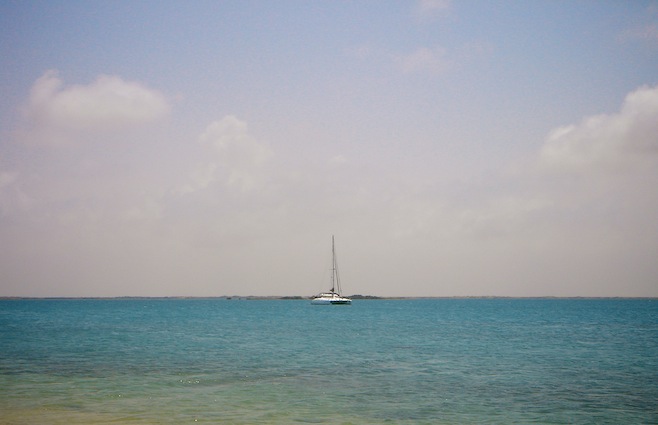
april 12 2006 : coast of sudan
The winds picked up the last couple of days, so we are still relaxing at anchor in Khor Narawat. Yesterday morning we had a small boat with a machine gun mounted on it, and four guys in passable uniforms, pull up alongside of us. One of them came aboard while the others sat back and watched. He spoke really good English, at least ten sentences worth, and was very pleasant. He took a quick look at our passports and told us we were welcome for as long as we’d like.
Then, since we were now such close friends, we had a quick discussion on why Ali and I didn’t have kids yet. That one never gets old. A couple who didn’t have kids because they couldn’t would probably breakdown in tears five times a week while talking with the locals here in Africa. They are relentless with the question of family.
The soldier and I were shaking hands and saying goodbye when Ali decided to go back inside. He then immediately turned to me and asked if we had any cigarettes or alcohol. Men won’t ask for anything as long as Ali is around, but as soon as she’s gone they’ll start begging. This guy had been really nice and it was clear from our anchorage that they were a long way from home, so we gave them two packs of smokes and told them we didn’t drink. Pretty harmless.
In the afternoon we went ashore to do some snorkeling, which turned out to be a bust. The seaward side of the island is supposed to have excellent snorkeling, but it was so windy that conditions were pretty bad on that side. I tried to go on our side of the island but there was so much grass and sediment floating around that I couldn’t see anything. The island itself is just a low, flat piece of dirt and scrub brush. Nothing too interesting. The landscape here in Sudan has been totally different than Eritrea. In Eritrea the view from the ocean was of towering mountains all along the coast, whereas here it is so flat that we couldn’t even see the coastline until we were under two miles away.
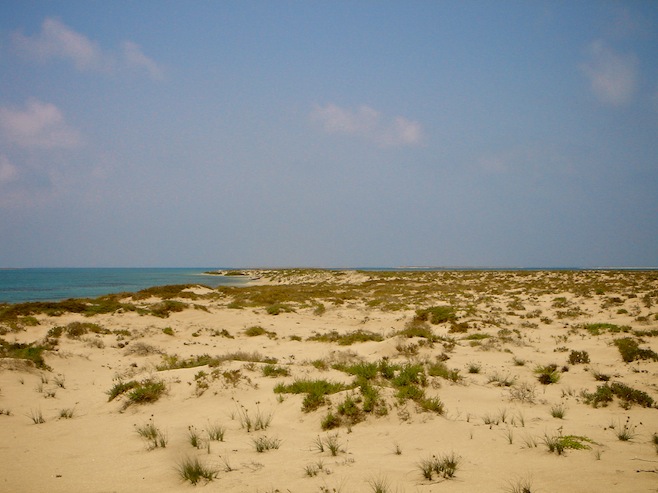
Tonight while cooking dinner Ali told me that I could let our stowaway out any time. Maybe put them to work cooking, doing dishes, or washing the boat. Something like that. It might not have been such a bad idea after all.
april 14 2006 : suakin, sudan, africa
We were up at three a.m. yesterday for another day long run to our next anchorage. Leaving a place like this, at three in the morning, wouldn’t have been possible for us ten years ago, but now our electronic charts are so exact that we aren’t even nervous about navigating through reefs and around numerous islands in the dark. The Sudanese coast is littered with small islands and reefs, five miles out from land with no navigational markings. In most places around the world, a coastline like this would be nothing but blinking lights after dark to warn the unsuspecting mariner. There must be a ton of sunken ships here.
Our anchorage was pretty unspectacular, though there was a lot of reef to go have a snorkel around. The coral was actually pretty interesting but again the water was so silty that you couldn’t see much further than about five feet which is never much fun. Every time a school of fish comes flying past you expect a big shark to come blasting along behind them and run right in to you. This anchorage also had a pretty wicked mirage. All around us it seemed as if there was ocean right behind a little strip of sand with an island of trees in the distance. But in fact it was nothing but a flat expanse of sand as far as you could see.
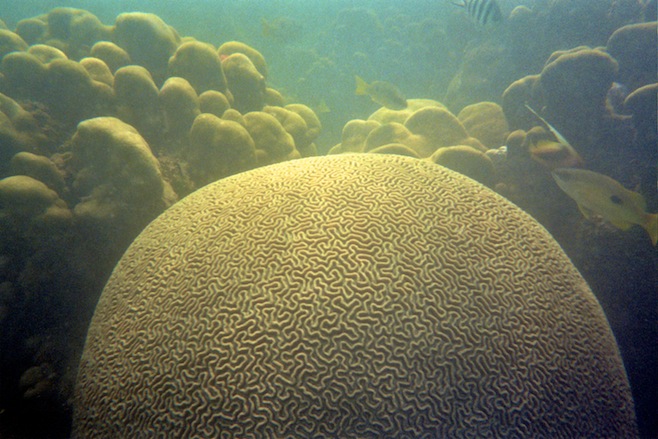
After relaxing for the afternoon and getting some sleep we were once again underway before the sun came up. The winds have been at their calmest in the early mornings which is why we’ve been anxious to get some miles in so early in the mornings lately. Although when the wind has shown up it hasn’t been so bad and has been staying off of our nose for the most part. We’ve been doing a lot of motorsailing which is something we’ll never complain about, especially here in the Red Sea.
Along the way today we were hearing this strange pinging noise every so often. I had a sinking feeling that it was the same pinging noise I had heard in Thailand last time when I found our dinghy davits about to bust off of the boat. I started looking around and sure enough, there is a fairly major crack once again. We have had the davits welded three times already on this trip, always different cracks, and yet again the crack is in a new spot. I don’t know if it is cheap materials, bad design, or just too heavy a dinghy, but it is extremely annoying. About all we can do right now is to try and be as gentle with it as we can and hope it holds out until Egypt where we can get in a marina and once again have a welder out to the boat.
By early afternoon we were pulling into Suakin, which is about thirty miles south of Port Sudan. Port Sudan is a city of about three million people and is a pretty major port, so Suakin has sort of become the easier of the two for clearing in to the country. It was also one of the coolest looking places we’ve ever sailed into. After winding a couple of miles inland the waterway splits off and you come to a place called Old Suakin. It’s this old port city that dates back a couple of thousand years, though it’s hard to say just how old the buildings are. The cool thing is that the buildings, or what is left of them, are made of coral. The whole place is crumbling but there are a couple of buildings whose shells are still pretty well intact.
Coming in on the boat we had to go right in by shore just a few yards from the edge of the buildings where families were strolling among the ruins and men fished along the shore line. We anchored, and I headed in to try and figure out how to get us cleared in.
I went to the ferry terminal where immigration was located and began wandering around asking for help. There were dozens of men in immigration uniforms but none of them seemed too eager to help me out, especially seeing as I didn’t speak Arabic. After bouncing around from one office to another I was ushered into another to find three officers clearing in about 500 people from a ferry. The passengers were all outside the windows while I stood there inside the office. They of course all clamored to get a look at the white guy, all except the immigration officers who wouldn’t even glance in my direction.
Finally, after standing there for about ten minutes one of them turns and looks at me sort of disgustedly and then turns back and says something in Arabic to which every one got a good laugh. Prick. He then flipped through my passport before sending me outside with yet another officer. This guy got out his cell phone, dialed, and then handed it over to me. Mohammed answered and told me to go back to my boat and that he would be there in thirty minutes. Turns out Mohammed is the local agent, and since it was painfully clear that I was not going to get anywhere at all on my own, I agreed.
On the way back I had to go through the narrow pass by the crumbling buildings and had a couple of ten or twelve year old kids hurl rocks at me. Of course they don’t play baseball and they didn’t even come close to hitting me, but I found it a bit disconcerting that not one of the adults sitting there said a word to them. I mean kids can be kids, and no doubt at that age I would probably have done the same thing, but never if there had been adults right there. Back at the boat I told Ali about the fun I had just had and we both agreed that we had an uneasy feeling about this place. Ali couldn’t nail down her reason, just her intuition, but I had just met about the most unwelcoming people I’ve ever come across. We got out the charts and started to have a look at what our options were. We were thinking about just getting out of here and heading on up to Port Sudan, but there was nowhere we could get to before dark so we scrapped the idea and decided to just sort of give the place a do over. Just try and start fresh and see what would happen.
Mohammed showed up right on time. He came aboard and we filled out paperwork. He was different than most agents in that he didn’t sit and try to make a bunch of chit chat or look around the boat eyeballing everything and asking for gifts. Instead he just did his work. That shouldn’t seem so strange, but it does. He turned out to be one of the most efficient people we’ve ever met. I brought him back to shore and he said he’d meet me back there in one hour with our clearance papers. Forty-five minutes later he was there. I dropped off my jerry jugs with him and again he told me he’d meet me in an hour. An hour later he was there with the jugs filled up, and it even looked as if he had cleaned them for me. Since he was doing such a great job we even dropped off what little laundry we had with him and he said he’d have it for us the next day. The guy is good, and well worth his $30 fee.
On a little side note, we’ve mentioned before what a crap shoot laundry service is out here. Basically we’ve resigned ourselves to having at least one item of clothing completely destroyed every time we have it done. Well lately it has gotten really sketchy. In Oman, they used a magic marker to put a small dot on every item of clothing. In Yemen, they drew giant H’s, next to the dots not over them, in magic marker. Finally in Eritrea they stopped using the marker and we thought things were looking pretty good, until Ali started wearing the clothes. The first two shirts she put on were full of holes, like they had used wire brushes to clean them with. Can’t wait to see what happens this time, it’s actually become funny at this point. And hey, no matter what it’s better than doing it ourselves.
The boat that had brought Mohammed out to us also began running a little side business the rest of the afternoon. He began bringing locals out to see the boat. Boatload after boatload they came, probably fifteen all told. The nice thing is that he never came very close, maybe 100 feet away, and he never cruised by our back door which is usually where everyone likes to go.
april 15 2006 : port sudan, sudan, africa
We made our way to the bus station early this morning for the short ride to Port Sudan. The bus was crowded, but was gloriously lined with open windows. These Sudanese know how to ride in style. Along the way the road was packed with camels, goats, donkeys, and beat up Toyota pick up trucks.
The homes and living conditions along the highway through the desert were extremely poor. Probably the worst we’ve ever seen. Most homes were only eight feet square and cobbled together with anything they could find. Other homes seemed to be more for the nomadic goat and camel herders. These were tents, five feet off of the ground, patched together from dozens of miscellaneous scraps of fabric, and held in the air by sticks.
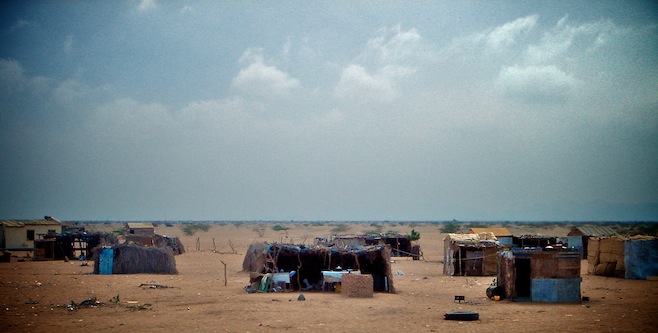
In Port Sudan the first thing that struck us was how few women there were. Thousands of men roamed the streets but hardly a woman could be seen. We didn’t have anything important to do, so we just started wandering aimlessly around town checking things out.
We noticed that the town was divided into distinct districts. There was the garment district where dozens of shop fronts were lined with men sewing robes using antique sewing machines. There was a market full of fruits and vegetables with some of the first English speaking locals we’ve come across trying to sell us their stock. Another street was nothing but telecommunications and cell phone outlets. It seems that no matter how poor and run down a place is, you can always count on there being plenty of cell phones and satellite dishes. By eleven it was so hot we could hardly move. That’s when we stumbled across an internet café. Air conditioning and high speed internet, what more could we ask for?
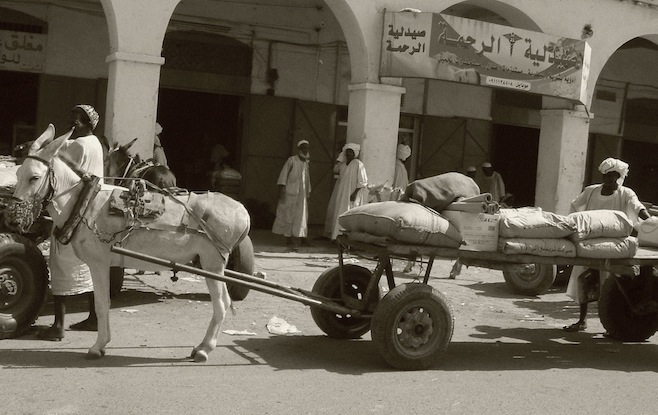
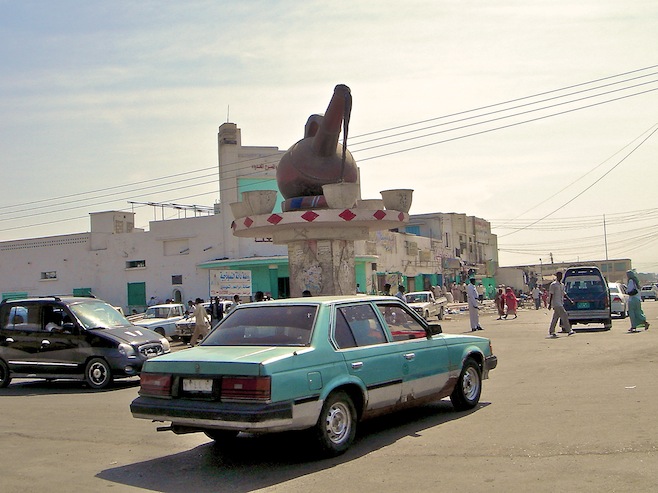
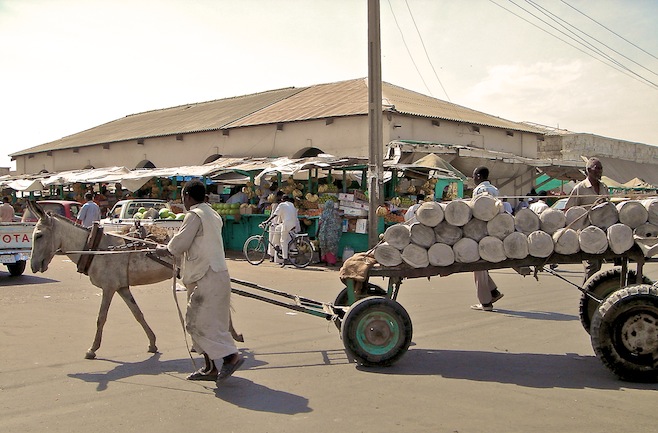
After internet we walked next door to a small restaurant. It was at a hotel, about a two star hotel, anything above a one star and we figure we can manage to find something familiar on the menu. Yet we were still surprised to find locals sitting around eating pizza, hamburgers, fries, and ice cream. We ordered up our pizza and sat talking for a couple minutes to our waiter who was from Massawa and was happy to hear that we had enjoyed our visit there. He said Sudan was nice but he seemed disappointed that you can’t get beer and liquor here.
After internet and lunch we started making our way back to the bus station. Along the way we noticed some teenage kids sitting on a mat having coffee. The coffee pots were boiling over a fire made inside a broken chunk of road, with the mat in the shade of a garbage bin. It was a coffee shop, though not exactly Starbucks. As we walked by they all smiled and asked us to join them.
They were all pretty excited when we sat down with them, and were full of giggles and hellos. The young guy who was running the show quickly served us each a tiny pot of coffee and miniature cup filled to the rim with sugar. We poured ourselves cup after cup and whenever our sugar went under halfway, he would top us off again. We had begun to draw a crowd, and soon there were dozens of people slowing down to watch us, or stopping to say hello and practice a few words of English.
We asked if we could take a picture and they eagerly said yes. After each photo they all clamored around to have a look at themselves. We’re always surprised by this since almost all of them have top of the line cell phones with cameras built in. Yet picture taking still remains a novelty. After the pictures a young boy came up to me, and while pointing at Ali asked, “Your wife?” I said, “Yes, my wife.” And with a big smile on his face he said, “My wife very nice.”
Eventually one guy stopped by who was clearly on drugs. Our new friends had a good time making fun of him, but he wouldn’t go away. He seemed harmless to us, but the kid who ran the place told us that maybe we should go. “This guy is no good,” he told us. I asked him what we owed him for the coffee, but he wouldn’t hear of it and wouldn’t accept a penny. We said our goodbyes and continued down the road.
Walking down the road we couldn’t seem to find the buses to Suakin. There was a huge parking lot full of buses but they were all for other destinations and we kept getting pointed farther down the road. We finally flagged down a bus and asked the driver if he was going to Suakin. He wasn’t, but he told us to get in anyway. He took us down the road to another group of buses, dropped off his passengers and then got out and led us to the right place. He told the driver where we needed to go and said goodbye. This was more of a local bus but it took us to yet another group of buses, one of which was going to Suakin. After waiting to make sure we got on okay they drove off. All in all a pretty fun day in Port Sudan. It’s got all those things that we love about cities; the vibrant colors, that certain stink, and a whole lot of hustle and bustle.
april 18 2006 : suakin, sudan, africa
After a day of doing nothing on the boat we spent another day in Port Sudan roaming around. Every trip in to a city becomes sort of like a scavenger hunt for us. The list yesterday seemed pretty simple, we needed butter and postcards. The butter was easy enough, there were plenty of tiny little supermarkets and we were even able to find one of our staple foods, Snickers. With those important things checked off the list we started searching for the postcards.
Our niece and nephew have gotten a postcard from every country we’ve visited, except for Colombia, and we didn’t want to break the streak now, but after walking all over town and even having a local bring us to a promising looking shop, we walked away empty handed. Later on it dawned on us that a quick trip to the Port Sudan Hilton would have solved the issue for us, but we were out of dinars by then.
Today we had set aside for exploring Suakin. First up, wander around the coral ruins of Old Suakin. We walked up to the main entrance and found three guards sitting there bored out of their minds. They produced a book of tickets with a cost to us tourists of five dollars each. Seeing as that was all the money we had on us, we decided to give it a miss. We can see most of the buildings from our dinghy anyway.
Instead we walked to the bus station and caught a pickup taxi for the two mile trip up the road to the main market district of Suakin, which is located closer to the main highway than the rest of town. The locals in the back of the truck with us were very friendly, and we were laughing and taking pictures the whole ride in.
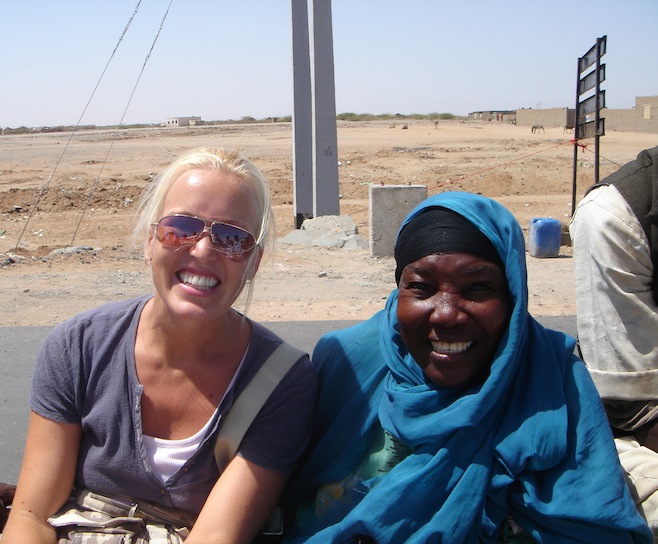
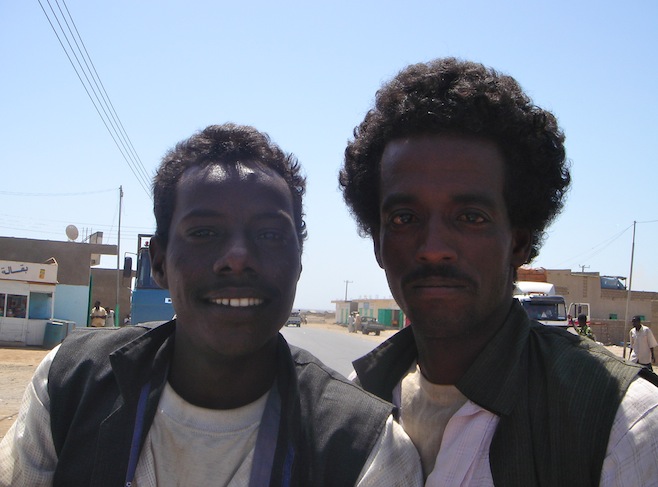
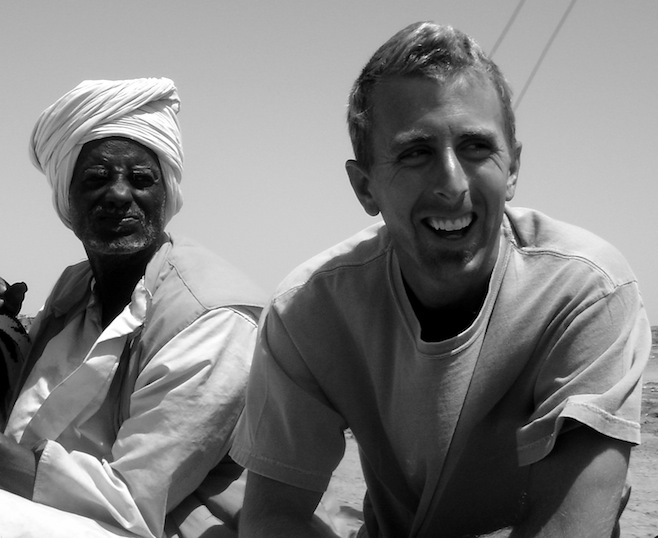
The main road through town is lined with one-story buildings selling sandals, cell phones, miscellaneous groceries, and goat heads. Ali was dying to cook a goat head for dinner but we couldn’t agree on a fair price, so we walked away empty handed, with an eye out for a restaurant instead. After walking the length of town, we circled back to a little roadside restaurant for some ful; a slow-cooked stew scooped up with flatbread.
There were nearly a dozen pots warming, all with different ingredients. The owner was happy to let us have a peak inside each to pick one out. We found our favorite, a simple bean stew with onions and a couple of other miscellaneous vegetables in it. Two bowls of ful, bread, a couple of Pepsis, and a cup of tea for dessert, all for two bucks. Down the road we stocked up on a couple weeks worth of bread and vegetables, and we still hadn’t spent the 2000 dinars we’d exchanged.
april 19 2006 : coast of sudan, africa (the red sea)
Up with the sun this morning we snaked our way out of the bay, past the ruins of Old Suakin, and in to the open ocean again. We knew from the forecast that it might not be a perfect day but decided to give it a try. Once outside we realized pretty quickly that we weren’t going to make much progress on a day like this. The wind wasn’t too strong, just enough to produce waves that were big enough to slow us down and it was right on our nose, so we cruised up the coast for about ten miles and pulled in to a little bay that is nothing more than a bit of deep water with a reef protecting us from the open ocean. We then proceeded to do quite a bit of nothing for the rest of the day. I went snorkeling and found that the coral looked okay but again the water was a bit milky and I couldn’t see beyond about ten feet. Not too amazing.
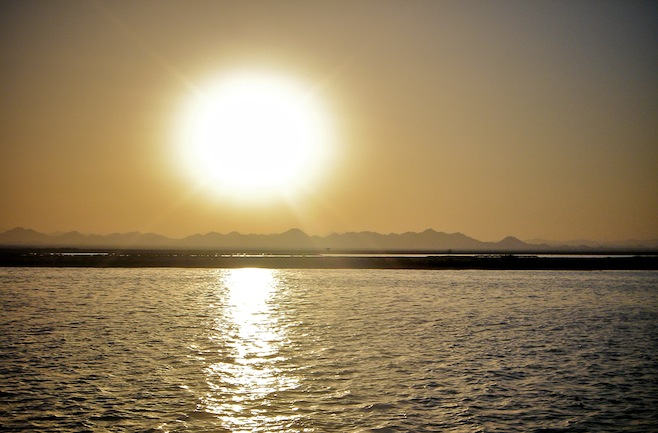
april 20 2006 : coast of sudan
Early this morning we left to make a fifty mile run north with sunny blue skies, and a light following breeze. Around four o’clock we made our approach to Marsa Fijab, our anchorage for the night. The entrance here is through a break in the reef which then follows a winding path for about a mile through numerous coral heads.
It looked pretty straightforward in the cruising guide, and our charts had good detail, so we weren’t at all concerned as we made our way in, despite the fact that the sun was getting low in front of us making the reef harder to see. We followed our now normal procedure with Ali down below on the charts while I steer the boat with one eye on the water and one on the cruising guide.
As we got close to the entrance, something didn’t look right when compared to what was on our charts. I came to the snap decision, wrongly it turns out, that the reason it looked off was that a buoy was missing. In this part of the world there seemed to only be about half of the number of buoys and channel markers that are on the charts.
We continued in and were about fifty yards away from another buoy when I suddenly noticed a distinct change in water color and saw the depth finder climbing rapidly from eighty to fifteen feet. We were already moving slowly so I jammed us in reverse to stop the boat. As I did so we floated over a coral head at just eight feet. By now Ali was next to me and we were pouring over the chart in the cruising guide trying to figure out what was wrong.
We finally realized that we were next to a completely different buoy, and that our electronic charts were off by a huge margin, at least a couple of hundred yards. This was the first time, other than a couple of minor details in marina-type areas, that our charts had been incorrect. If the weather had been bad when we tried to come through we could have easily found ourselves in serious trouble. Fortunately we had calm conditions and were able to simply back the boat out the way we had come in and slowly creep our way in by sight. No worries. The next morning on our way out we turned the chart tracking on to show how off the charts were.
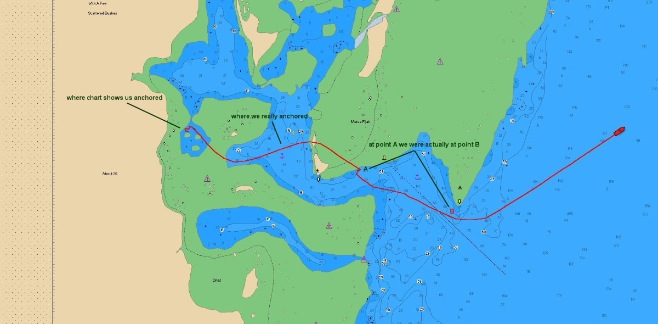
april 21 2006 : en route to egypt (the red sea)
Looking over our weather files the past couple of days we were pleased with what we were seeing. The three day forecast showed virtually no wind. With 380 miles to go until our clearance port in Egypt, we decided that we’d had enough of the forty mile day hops and this was the perfect opportunity to make a run for it.
So after blindly fumbling our way out of the Marsa Fijab anchorage we started north. It was another beautiful day and we were motorsailing nicely with just the port engine running. After a few hours we reached what would be the last of our reef areas before we made it out to the deeper water farther offshore.
Our charts for the area weren’t very detailed so Ali and I were both out on deck keeping an eye on the reefs, one hundred yards away on either side of us. The water was 200 feet deep but occasionally would shoot up to fifty, at which point we could see the bottom as clearly as if it were five.
As we stood there we suddenly heard a weird clunk that sounded as if we had hit a small log or buoy. I was standing at the back of the starboard hull watching behind us to see if anything popped up to the surface, but nothing did. I decided to put on my mask and have a quick peek under the boat. I stuck my head in, had a look around, and thought, “huh, that’s a new one.” Our prop was gone. The noise we heard was the prop sliding off the shaft and hitting the rudder before falling down to the ocean floor.
Engines are awfully big and have lots of parts. A couple of which I even have spares for. But there is one spare I don’t have that is really, really necessary in order to make the boat go, and that is a prop.
With 350 miles to go, we now have just one engine. What the hell, we needed a little challenge anyway. I don’t know if monohullers bring an extra prop along, but I do know that I was once again very happy to have two engines. To brighten the day we did have a couple groups of dolphins visit us. First the little guys and then later the big bottlenose.
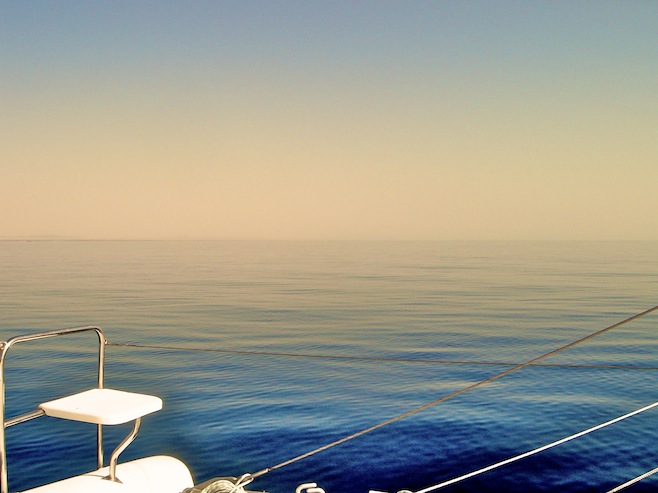
april 22 2006 : en route
Today we had an adverse current combined with just enough wind on the nose to create small waves and really slow us down, as we plodded along with no sails and one functioning engine. Our speed was under three knots all morning which is really a depressing rate to be moving at.
For some reason our slow speed didn’t keep the dolphins from enjoying our company though. We had a huge pod, maybe close to 250 of them, stay with us for hours. We sat up on the trampolines and watched them until the sun became too much and we had to retreat back inside. Eventually the wind shifted slightly and our speed picked up. For a couple of hours anyway. Now in the middle of the night we are motoring along in total calm.
april 23 2006 : en route
I know I talk about them all the time, but they are so cool that I just have to. Today a group of dolphins were floating in a big circle about a hundred yards away from us. There was zero wind, making the water so calm we could watch their fins move lazily across the top. Then all of a sudden it was as if their teacher told them they could have a five-minute recess. They broke rank and began screaming towards us, jumping over and racing each other. From the top of the boat we could see them perfectly the entire way, even the looks on their faces. They swam with us for a few minutes and then just like that they spun and raced back in the direction they had come.
Despite the fact that we’ve probably replayed that scene a hundred times on this trip it never becomes any less exciting. It’s become almost impossible for us not to personify them. We wonder what they are thinking, if they know that we are standing right above them, if they are trying to impress us, and why they aren’t the least bit afraid of a boat that is so much larger and louder than they are. One hundred and sixty miles to Egypt.
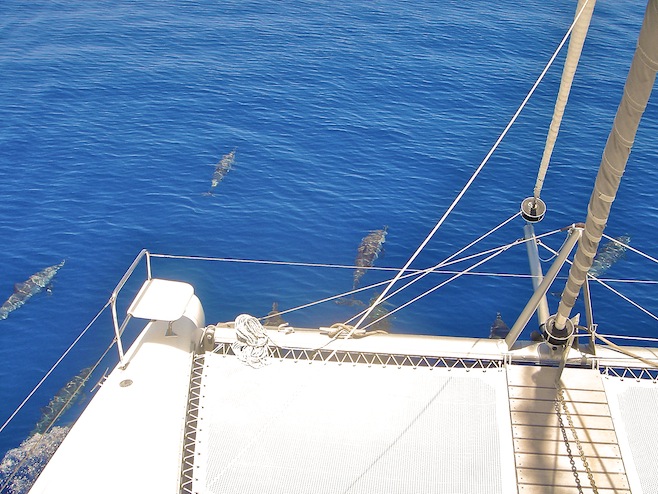
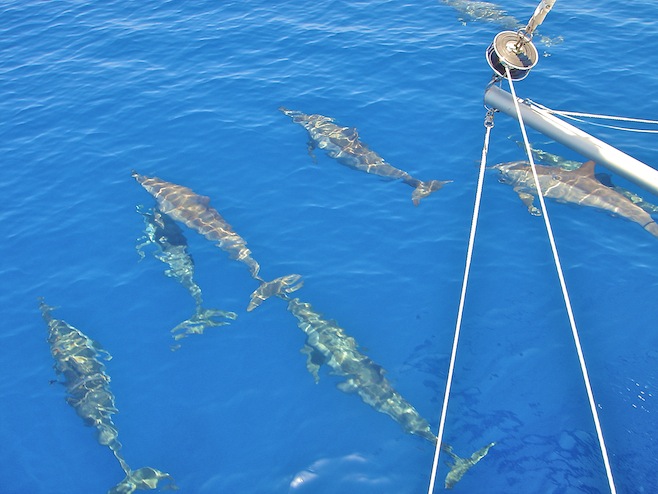
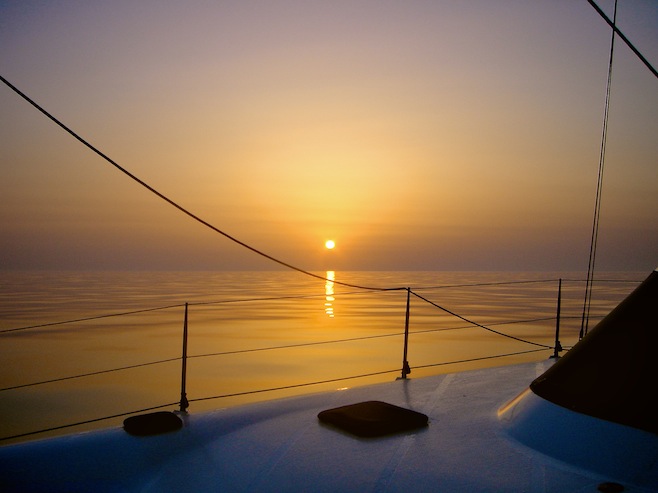
april 24 2006 : en route
After three days of great sailing/motoring weather, things took a turn for the worse. Yesterday we sailed downwind all afternoon with the screecher in twelve knots of wind. We were amazed since those winds are relatively unheard of in this area of the Red Sea.
Just after dark the wind shifted closer to the nose and then died away completely. At this point we were still pretty happy. We now had flat calm seas and were motoring with a favorable current at over five knots. Then within minutes the wind climbed from zero to twenty knots on the nose. In another hour it was blowing thirty knots and we were being forced to tack way off course, out towards the middle of the Red Sea. The forecast had shown nothing over five knots so we bobbed through the big waves expecting that it would pass through. But after pounding away for a few hours we finally gave up and decided to turn back to the last reasonable anchorage we passed by earlier in the day.
Normally this is an easy decision for us, but with the loss of one engine we were reluctant to enter an area full of coral. The boat is extremely hard to maneuver using just the one engine, and if we were to get ourselves lost in the middle of a coral field, we could be in serious trouble, especially with thirty knots of wind.
It took us four hours to cover the ten miles back to the anchorage. The last three miles we had to motor directly into the wind and waves with no sails up and just our one tiny engine chugging away. The area we were headed for was called Fury Shoals, a large area of shallow water with a few different reefs dotted around it.
We finally came to our chosen reef, so chosen because it had the least amount of off lying coral heads surrounding it. Inside the horseshoe shaped bay there were a couple of large mooring balls floating right next to the reef. We happily motored up, tied onto a mooring, and settled in to watch the big waves crash against the reef just fifty yards away.
The nice thing about this unexpected stop is that the snorkeling is good. I went for a swim today and found that I could see the bottom perfectly in eighty feet of water. It’s been a long time since we’ve had that sort of clarity. Along the reef I found the best coral of the entire trip. The colors were amazing, and combined with the white sand on the ocean bottom, the entire area just seemed to glow. It was obvious why throughout the course of the day we saw at least one hundred different dive boats. And the dive boats here must be doing good business because every one of them is a brand new white super yacht. None of those rickety wooden two deck dive boats that you seem to see everywhere else.
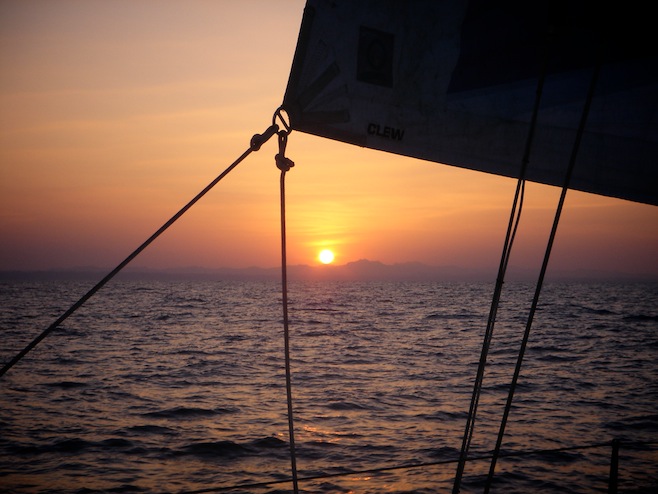
april 26 2006 : port ghalib, egypt, africa
Yesterday morning we went and did some more snorkeling. Ali agreed that it was the best of our trip so far. Not all that many fish, but the coral was really cool the way it just shot straight up from 80 feet to 1 foot below the surface and the entire wall was colorful and actually living.
After a couple morning swims we settled down in the afternoon for some beer and cards. While we sat there in the cockpit we started to realize that the boat was really shifting and that the wind was now coming from the south, perfect for us. We made the snap decision to go right then and try to make the overnight run up to Port Ghalib. We were a little nervous a couple hours later as the wind started to shift back up towards the north, but as it did it slowly died out and we spent the rest of the night motoring in calm seas yet again.
Everything went perfectly until morning when we were 10 miles away and the wind really started to kick in again right on the nose, but we were practically there by then and by noon we were safely tied up at the marina. It’s funny, we had a lot of anxiety about this trip up the Red Sea but the sailing has turned out to be nearly as easy as the trade wind belts. I’m now convinced that every sailing book I’ve ever read has embellished their story to make their journey seem much harder and more heroic than it actually was.
april 28 2006 : port ghalib
It turns out that being in a marina is more dangerous, once again, than being out at sea maneuvering through reefs. After getting checked in the other day we had to move the boat to a cement wall near the resort hotel. Having only one engine we asked them if they would help us and pull us off the wall we were currently on with their dinghy. Turns out the marina doesn’t have their own dinghy so we waited a half an hour while they tracked down a dive boat dinghy to borrow.
They pulled us off okay and we motored across the sprawling complex to our wall. As we approached I realized the wind was going to be a problem. Using only one engine on a catamaran tends to make it spin in a circle at slow speeds, so as we came up on the wall and I tried to slow us down all I really accomplished was spinning the boat. The dinghy was able to maneuver around us and slow us down though and we eventually got a couple of lines over to the dock.
At that point I jumped off and started to try and get the lines straightened out. As I was getting off I heard a crunch and looked forward to see that the bow had managed to spin far enough around to hit the cement wall and was being scraped. I pushed us off and noticed at that point that the marina employee working the stern line still hadn’t tied it off and was giving it more slack which was causing the back of the boat to float straight out. We yelled at him to get it tied off, which he finally did, and we thought everything was settled. As I was bending down and tying off the bow line I heard a crack and turned to see the back of the boat now being smashed against the wall. Apparently the guy on the dinghy was at the back of the boat pushing as hard as he could to get the boat back against the wall.
So somehow, despite the fact that there were five people, four lines, and 6 fenders, we managed to damage both the front and the back of the boat. It’s not terrible damage, the front scrape is about the size of a penny and the back crack is on a little lip area that runs along the back steps, but man does it ever seem stupid to get damaged in a marina.
After two days here we are ready to leave, but can’t. This is truly the worst marina we’ve ever been in. It is actually just a giant resort complex that is still under construction. The only thing that is finished is one hotel that has a dive shop and a gift shop in it. The bar charges 4 times the price for a beer than the rest of Egypt, the restaurant is mediocre, and internet cost $12 an hour. And since the marina is under construction there isn’t even water or power at the dock, which means after three months of an extremely dirty boat we can’t even wash it. But worst of all is that Port Ghalib is a self contained community. There is no town around here or anything, we are just stranded at an overpriced resort teeming with sunburned German divers on holiday.
.jpg)
april 30 2006 : cairo, egypt, africa
I know it had only been a couple of days but we were going nuts at Port Ghalib Prison and had to make our escape. To do so though we had to find an inside source. We talked to a few marina employees and tried to glean some information on how exactly we could get out of there and move on to Cairo but weren’t getting anywhere. Not even the resort’s travel agent was talking. The only information we could get was to fly out on their twice weekly shuttle flight. That sounded terrible. Not to mention expensive. Then finally the hotel manager came through for us. It was like a lightbulb switched on in his head and he suddenly said, “Oh, there is a local bus every night at seven that runs up the coast to Cairo.” Perfect! We spent the rest of the day finishing up work around the boat and at 6:30 were back up at the hotel to catch a ride to the bus stop. For just $14 they drove us the two miles.
The 12 hour bus ride that covered about 500 miles cost us just twice that. It felt great to be out of the resort area complex and actually see some real people. We stood out in the middle of the desert at a crossroads and waited for a bus that we weren’t 100% positive would even let us on. We were feeling a bit out of place as locals came and went, some sharing a taxi, and some riding in the back of trucks full of camels. Eventually a few of them approached us and broke the ice and made us feel welcome and assured us the bus would be there at 7:00. At close to 8:00 the sun had gone down and we were beginning to wonder if it would ever show, when it appeared roaring over the hill. A few people made a mad dash for the door and we joined in. The drivers assistant jumped off and stood there like he was a bouncer at Studio 57, picking and choosing who would get on. Of course he recognized us from our acting days and we were in.
The bus was much better than we’d expected. It was just an old tour bus that had gotten a little too shabby for the resorts to use anymore but was perfect for the local riff-raff. Ali and I got good seats right in the back. We were stoked just to be on our way to Cairo. The ride was relatively uneventful and stopped every hour or two for a few minutes of stretching and buying food. A couple of very nice twenty something guys sitting in front of us came back from one outing and handed us a whole bunch of junk food. Ali was pretty excited to see Twinkies again. We realized at that point that our tastes in food haven’t changed a whole lot since we were about ten years old. Favorite food, pizza; favorite drink, cherry Kool-Aid; favorite dessert, Hostess snack cakes.
We had been completely unsuccessful in locating a travel guide for Egypt, so when we arrived in Cairo at 5:00 a.m. we really had no idea of what to do or where to go. So we decided that the simplest thing would be to head for a major hotel to get our bearings. We grabbed a cab and took off.
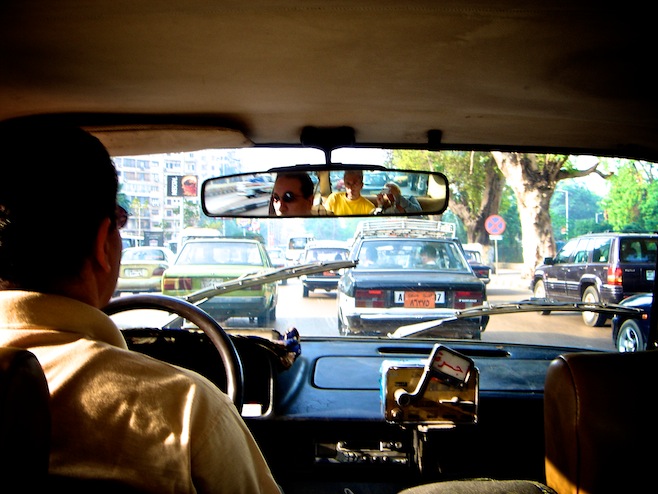
Strange thing about cabs here is that you don’t haggle over price before going, instead you are expected to know a fair price in advance and to simply hand it over upon arrival. Of course when you do that there are two reactions. One is a simple nod of the head. What this means is that they are happy because you have grossly overpaid. The second reaction is for them to stare at you and keep motioning with their finger as if you should continue to pile money up in their hand until they say stop.
We’ve found a nice little trick that seems to be working pretty well. What we do is pay as low a price as we think we can get away with but also hand over two Marlboro cigarettes with the money. That always gets a smile and seems to help buy us time to get out of the cab without an incident. Here in Egypt we’ve taken to carrying around a pack of cigarettes just for situations like this. I believe that the number of smokers here is hovering at around 99%. They smoke everywhere. I can’t wait to go the National Museum and see them standing around a three thousand year old mummy blowing smoke rings at him. Not that it would matter much, we read that Cairo out-pollutes L.A., and that breathing the downtown atmosphere is akin to smoking 30 cigarettes a day.
We arrived at the Nile Hilton and strolled in like we belonged there, heading straight to the café for breakfast and to try and kill a couple hours. After lounging around for 90 minutes we started feeling like we should move so we relocated all the way to the lobby. It was now all of 7 o’clock.
We were actually waiting for the bookstore in the lobby to open so we could get ourselves a guidebook, but after another half hour we decided to ask when that would be and found out not until ten. So we decided to just strike out and search for a hotel. After wandering around aimlessly for another hour we gave up on that idea and caught a cab. I thought I had remembered reading that there was a large bookshop at the University. We got in a cab and had him take us to Cairo University on the other side of that little river, the Nile. When we got there the guard wouldn’t let us through but he told us to wait. He then went in and started stopping students until he found one that spoke English. She came over and was all smiles as she explained that the bookstore here wouldn’t have what we needed but that we should go and try the American Cairo University, which as it turned out was only a block away from where we had just been. After another cab back there we found the University bookstore and felt like we were in a Barnes and Noble. The place was huge and had everything. We found our guidebook and finally, at ten o’clock, were on our way to a hotel.
The first place we tried was a terrible dive, but it was on the same street that the Volvo parts supplier we had tracked down on the internet was supposed to be on. We walked back out on to the street and had a look around and saw a huge Volvo sign running down the side of a building right across the street. We couldn’t believe it. We walked over there and circled the building twice looking for some sort of entrance but couldn’t find one.
There was a big Perkins engine shop down a block though, so we tried in there. They didn’t know what we were talking about but when we showed them the name of the place and the address they all got in a huge discussion between themselves. It’s fun to watch one of these boisterous conversations take place. We can’t understand a word of it but just seeing how animated and loud they get it seems like there is a heated argument going on even though it is just a civil discussion about directions. Finally the girl who spoke English wrote the name and street number in Arabic for us and told us it would be easiest to catch a cab.
So back in a cab we figured we would be there in a minute. Half an hour later we were still driving in circles. Our driver would stop at every single street corner and just yell out “Orascom!” at anybody who was standing nearby. That was the name of the place and at every corner some local would point down a block or two and maybe indicate a turn or two as well. When we’d get there there’d be nothing and we’d go through the whole thing again. After driving around forever we finally found it. “Orascom!”
Inside we found the office we needed and then stood outside waiting for somebody to acknowledge us. We stood and stood until another customer came along and motioned us to follow him inside and we all sat down. There were three employees in the place but nobody said a word to any of us. After a few minutes a boy came in and took coffee orders from the five customers now sitting inside. After polishing off our coffee we still hadn’t spoken to anybody.
Finally, after at least half an hour, a guy who seemed to be the boss arrived and got down to business. We asked him about our part and he told us that unfortunately he was not the Volvo supplier. Apparently the Volvo website and the Red Sea guidebook were both wrong on this account. He did however give us the phone number. We asked if it would be possible for him to call for us, but he said no. Fortunately one of the other customers was a friendly guy who spoke some English and he grabbed the phone number and made that call, plus half a dozen other phone calls around town for us trying to track down our prop. Somehow in the end we had our parts ordered from the supplier, and they were set to arrive in a week.
By now it was after noon and I was still lugging our bags all over town. We found another hotel and made our way over there. The room was passable and after a little haggling in which we had to actually pick up our bags and walk towards the door we made a deal. It was at this point that we met the unbelievably annoying bellhops. One guy brought us up to the room where we found that another bellhop was waiting with our one bag. Somehow they had perfected this technique in which it takes two guys to deliver just one bag to a room. Alright, that doesn’t sound so bad, they even do that in the States. But these same guys later turned out to double as the most annoying touts we have ever met as well. They stand next to the elevator and do nothing but hound you about where you are going and what you are doing, all the while telling you that you are being ripped off and should use their services if you need anything at all. Of course at this point if you had your hands full they wouldn’t even lift a finger to press the elevator button for you.
The hotel room, upon closer inspection, turned out to be a little less than we had bargained for. When we had looked at it beforehand it hadn’t yet been made up after the last guests checked out. Now when Ali went through her more thorough room inspection we could clearly see that they hadn’t changed the sheets on the bed, they had simply made it. It was so obvious because there was actually two small beds pushed together. One had spotlessly clean sheets with ironing marks on them and the other had wrinkles and hairs.
So on our way back out I went up to the manager and asked him politely if we could have the bed sheets changed. He looked at me as if I had just asked him for $100 and asked, “Why?” Not why as in “Why, is there something wrong?” He asked why as in “Why should I?” The fact that a hotel manager would question why a guest wanted clean sheets at all is a mystery to me, but there it was. Somehow later we found that they had changed the sheets. Only on the one bed though which proved to us that they knew exactly what they were doing earlier when they left the dirty sheets on the one bed. Nice place we’ve got ourselves here.
We spent the rest of the day pretty much just wandering around the city. Cairo obviously sees plenty of tourists so we walked around in total anonymity. Only occasionally being hit up by a tout for one thing or another. For some reason I had been expecting the Nile to be some amazing sight in itself, but it turned out to be nothing more than a little river in a sprawling city. We walked over to the Cairo Tower, yes, every city in the world seems to have a tower, and took the lift to the top. The city seems to spread out in every direction and go on forever. We could just barely make out the three pyramids of Giza through the thick pollution haze hanging over the city but it was still cool.
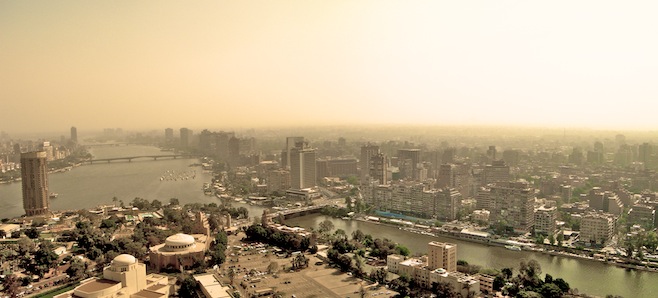
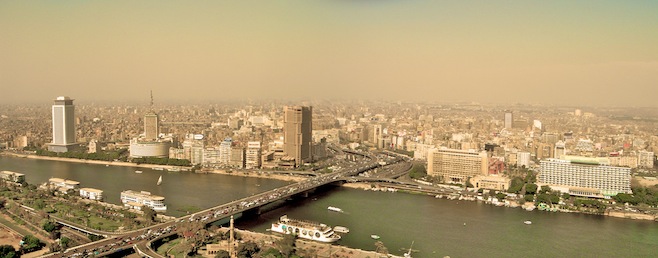
Finding a beer in Cairo can be a bit of a challenge. You can of course get one in all of the major hotels, but that isn’t much fun. We eventually found Café Riche where Saddam Hussein used to booze it up when he was in town. These days there are no dictators hanging around and instead just a handful of tourists straggle in out of the heat looking for a Stella. Stella is an Egyptian beer brewed since 1897. Ali and I are still trying to figure out how a country can brew a beer for over a hundred years but still make us sit in a back room to drink it. We couldn’t have a table overlooking the street because that would just be improper. So one quick Stella and we were back out on the streets. We managed to track down some very important boat items while we were out there. Most important of all was a few more tubes of super glue. We also scored some new movies from the friendly neighborhood movie pirate.
At the end of day one in Cairo we were pretty happy with the place. It was full of ups and downs though. It seemed that every time we were talking about how nice everybody was we would be met with a pushy taxi driver or an annoying bellhop tout. But as far as first impressions go Cairo did much better than we had been expecting from other traveler tales.

.jpg)
.jpg)
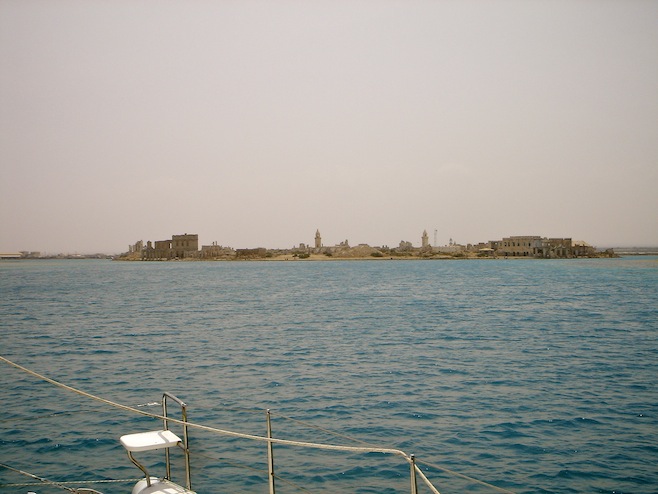
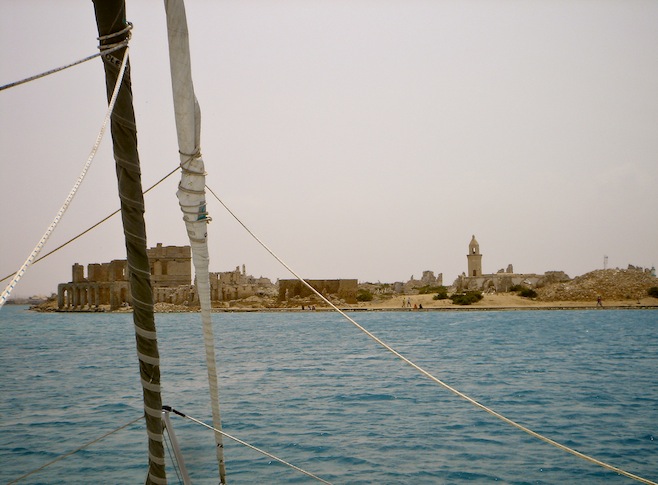
.jpg)
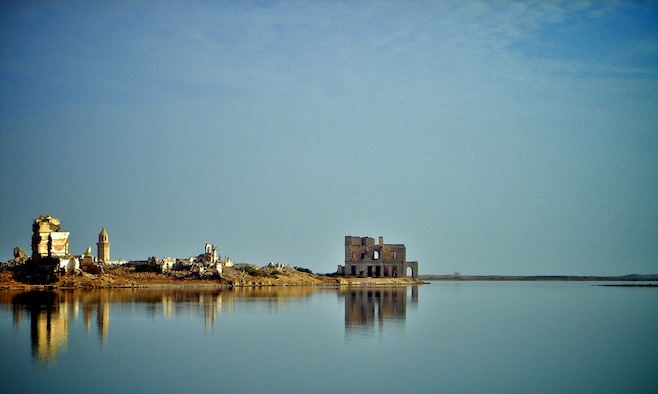
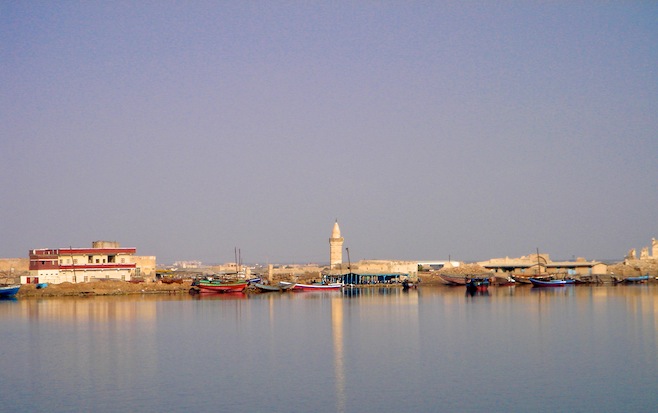
.jpg)
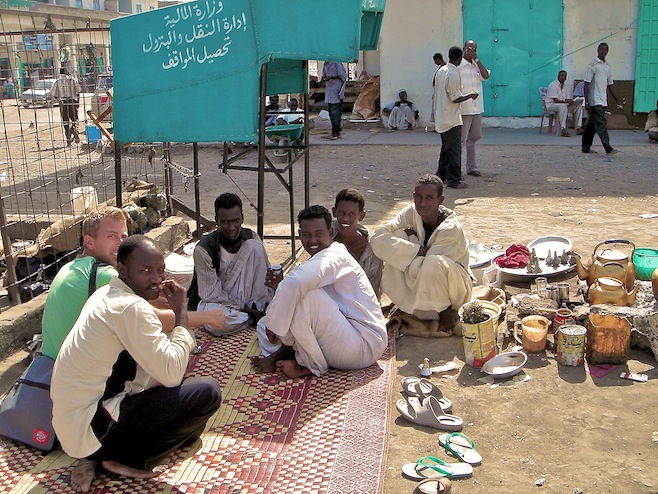
.jpg)
.jpg)
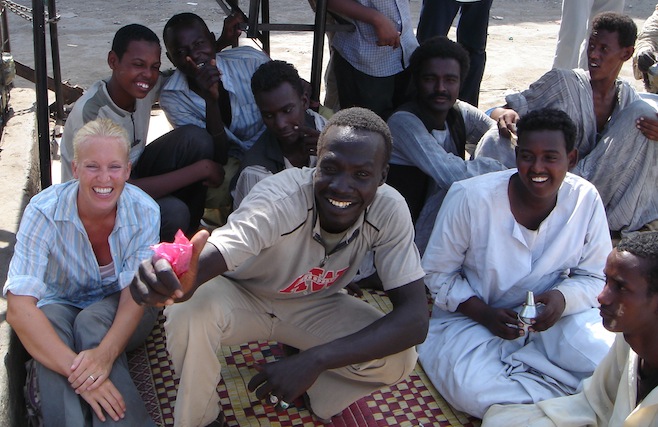
.jpg)
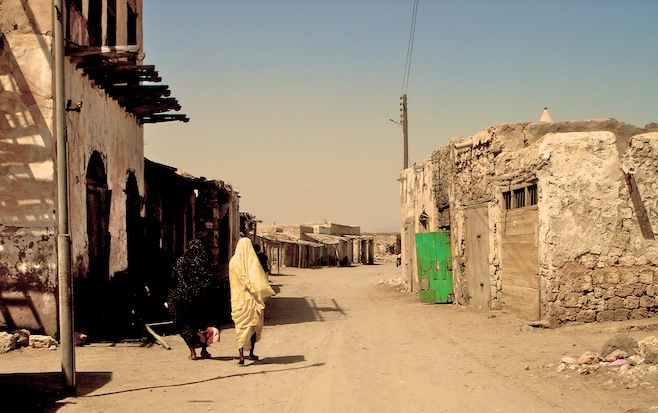
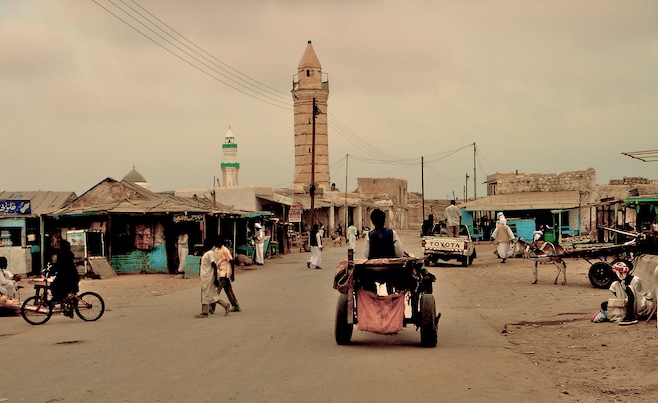
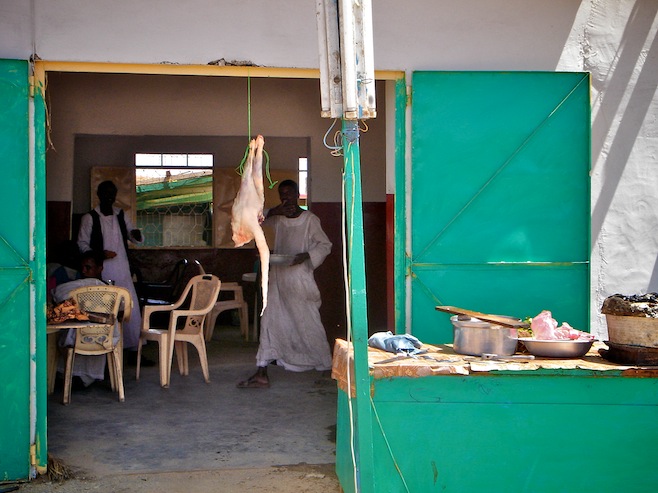
.jpg)
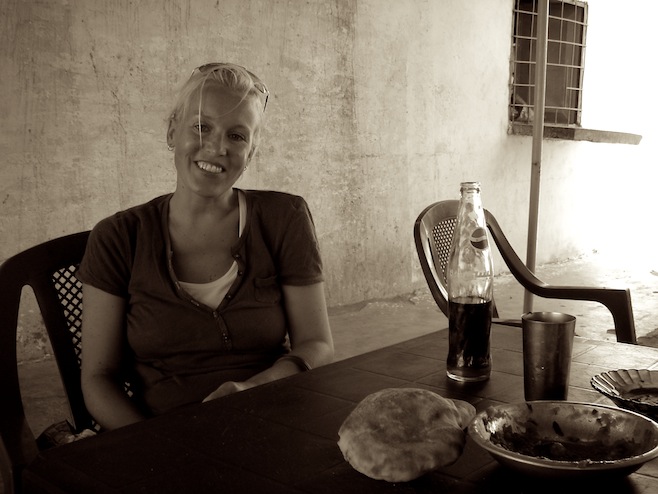
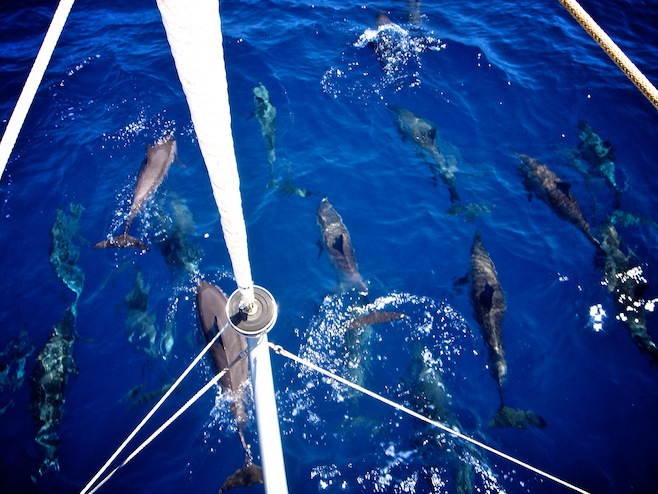
.jpg)
.jpg)